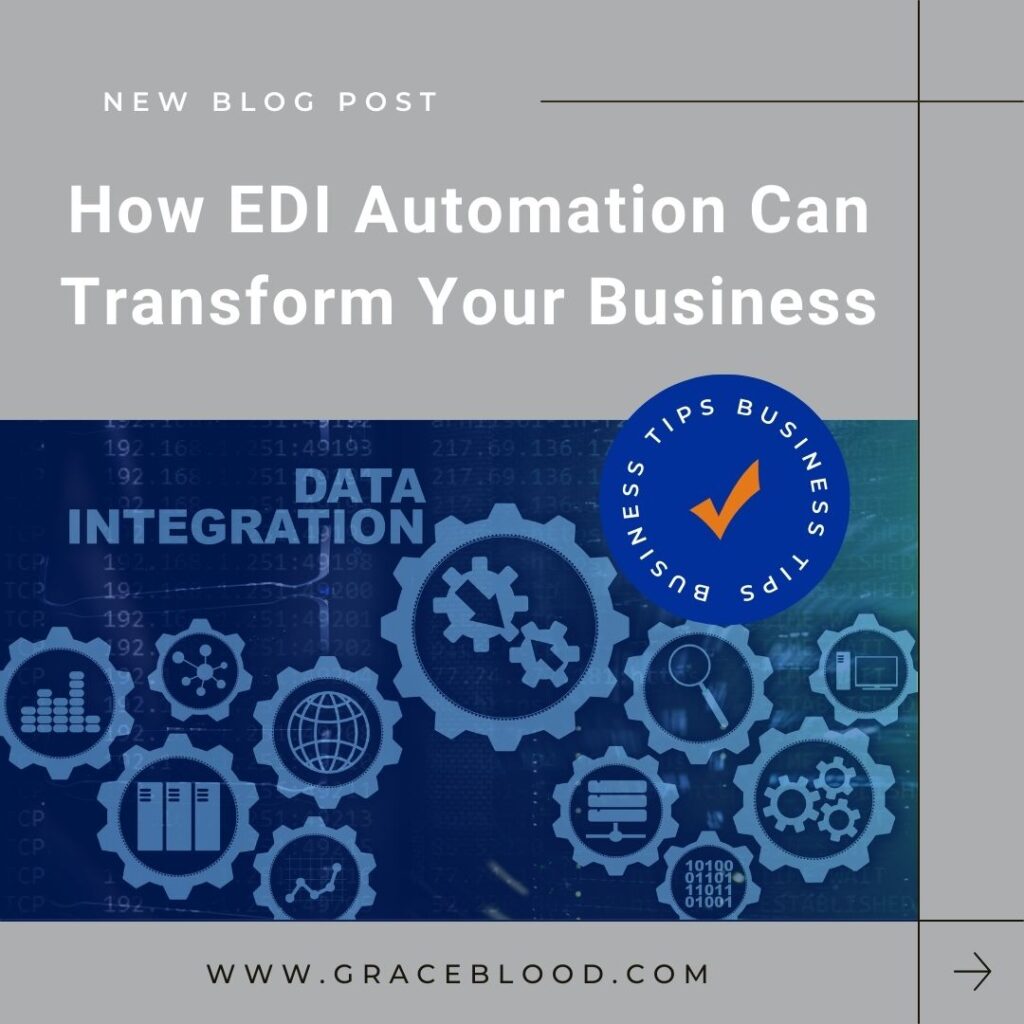
Black Friday and Cyber Monday have become global retail phenomena, generating billions in revenue within a short span of days. Bain.com predicts that this year’s shopping weekend will hit a staggering $75B! Behind the seamless shopping experiences that millions of customers enjoy is a sophisticated network of technology. This technology ensures that ensures everything runs like clockwork. At the heart of this network lies EDI automation, which plays a pivotal role in enabling these massive shopping events.
EDI ensures that retailers, suppliers, and logistics partners can efficiently manage inventory, and process orders during these high-demand periods. Here, we explore how EDI automation underpins the success of Black Friday and Cyber Monday, touching on aspects like inventory management, order processing, supplier coordination, logistics, and customer satisfaction.
Table of Contents
- Managing Inventory with Precision
- Accelerating Order Processing
- Enhancing Supplier Coordination
- Optimizing Logistics and Fulfillment
- Supporting Omnichannel Retail
- Ensuring Compliance and Standards
- Enhancing Customer Satisfaction
- Facilitating Global Transactions
- Preparing for the Surge
Managing Inventory with Precision
One of the biggest challenges retailers face during Black Friday and Cyber Monday is inventory management. The dramatic spike in consumer demand can lead to stockouts, overstocking, or logistical bottlenecks. EDI automation like GraceBlood’s VelociLink™ platform mitigates these risks by enabling real-time visibility into inventory levels across the supply chain. And with the increased use of APIs, EDI data is now being transferred in real-time rather than batches, speeding up the order lifecycle like never before.
Real-time Inventory Updates: EDI facilitates the electronic exchange of inventory reports (EDI 846). For instance, retailers can quickly share stock availability with suppliers and distributors, ensuring that high-demand products are replenished promptly.
Automated Reordering: As inventory levels drop, EDI can trigger automatic purchase orders (EDI 850) to restock goods, preventing delays and customer disappointment. For example, during Black Friday, a retailer selling electronics might see a surge in demand for gaming consoles. EDI ensures that the retailer’s warehouse systems and suppliers are instantly informed, allowing them to respond without the lag of manual processes.
Accelerating Order Processing
The sheer volume of transactions on Black Friday and Cyber Monday can overwhelm manual order processing systems. EDI automates the entire order lifecycle, from the moment a customer places an order to its fulfillment and shipment. Speed and accuracy are critical when millions of customers are clicking “Buy Now” simultaneously, expecting their orders to be processed without delay.
Streamlined Order Management: With EDI, retailers can instantly process purchase orders, confirmations, and invoices. For instance, the EDI 850 (purchase order) document ensures that orders are placed accurately, while the EDI 855 confirmation acknowledges receipt of the order.
Error Reduction: Manual data entry is prone to errors, especially under pressure. EDI eliminates this risk by automating data transfers between systems, ensuring accuracy even during peak volumes.
Enhancing Supplier Coordination
The success of Black Friday and Cyber Monday relies heavily on flawless coordination between retailers and their suppliers. EDI provides a standardized platform for this collaboration, enabling smooth communication and efficient supply chain management. Consequently, by keeping suppliers in the loop, retailers avoid the risk of stockouts on popular products like toys, gadgets, and apparel, which are often the focal points of holiday sales.
Vendor-Managed Inventory (VMI): Many retailers use EDI to implement VMI programs, where suppliers monitor stock levels and replenish inventory as needed. This ensures that shelves are never empty, even during a shopping frenzy.
EDI Forecasts (EDI 830): Retailers can share demand forecasts with suppliers using EDI 830, enabling suppliers to prepare for anticipated spikes in orders.
Optimizing Logistics and Fulfillment
Once an order is placed, the next critical step in supply chain management is delivering it to the customer. The logistics behind Black Friday and Cyber Monday are a monumental challenge, with millions of packages needing to be shipped within tight timelines. EDI ensures that this process runs smoothly.
Shipping Instructions and Tracking: EDI 856 (Advance Shipping Notice) allows suppliers to notify retailers of shipment details, including contents, delivery dates, and tracking information. This helps retailers manage customer expectations and reduce delivery delays.
Carrier Coordination: EDI enables retailers to collaborate with logistics providers by sharing shipping schedules and freight details (EDI 214). This level of coordination is essential for managing the surge in shipments during Cyber Week. Furthermore, with same-day and next-day delivery becoming the norm, EDI ensures that packages are tracked, routed, and delivered efficiently, keeping customers satisfied.
Supporting Omnichannel Retail
Black Friday and Cyber Monday are no longer confined to physical stores or online marketplaces—they are omnichannel events. Customers expect to shop seamlessly across multiple platforms, whether in-store, online, or through mobile apps. Furthermore, EDI plays a critical role in enabling this omnichannel experience.
Unified Data Exchange: EDI ensures that inventory, orders, and shipments are synchronized across all sales channels. For example, a customer buying an item online for in-store pickup can trust that the product will be ready when they arrive.
Dropshipping Integration: Many retailers rely on dropshipping during Cyber Week to meet demand without holding excessive inventory. EDI facilitates the direct transfer of orders to third-party suppliers, who ship products directly to customers. This flexibility allows retailers to meet customers wherever they are, offering a consistent shopping experience across all touchpoints.
Ensuring Compliance and Standards
Large-scale events like Black Friday and Cyber Monday involve multiple stakeholders, from manufacturers to shipping carriers. Ensuring that everyone adheres to common standards is essential for smooth operations. What’s more, EDI provides the framework for this standardization. Without it, the chaos of disparate systems and inconsistent communication could derail the efficiency of order fulfillment operations.
Compliance with Trading Partners: EDI ensures that all parties use standardized document formats, reducing the risk of miscommunication or incompatible systems.
Retailer Requirements: Many major retailers mandate that their suppliers use EDI for transactions. This compliance ensures that all processes, from order placement to invoicing, meet agreed-upon standards.
Enhancing Customer Satisfaction
Ultimately, the success of Black Friday and Cyber Monday hinges on customer satisfaction. EDI contributes to a positive shopping experience by ensuring that customers receive accurate information and timely service. For example, by minimizing errors, EDI helps retailers build trust and loyalty, even during the chaos of holiday shopping.
Accurate Stock Availability: EDI ensures that online stores display real-time stock levels, preventing customers from purchasing out-of-stock items.
Efficient Returns Management: With EDI 180 (Return Merchandise Authorization), retailers can streamline the return process, making it easier for customers to return or exchange items.
Facilitating Global Transactions
Black Friday and Cyber Monday are no longer limited to the United States. They’ve become global events, with customers and retailers participating from around the world. Moreover, EDI enables seamless cross-border transactions by standardizing communication between international trading partners.
Currency and Tax Handling: EDI ensures that international orders comply with local currency and tax regulations, making it easier for retailers to expand their reach.
Global Logistics Coordination: EDI facilitates collaboration with global shipping carriers, ensuring timely delivery of international orders. Furthermore, this global capability allows retailers to tap into new markets without being hindered by logistical complexities.
Preparing for the Surge
Months of preparation go into making Black Friday and Cyber Monday successful. And EDI automation is an integral part of this planning process.
Demand Forecasting: Retailers use EDI to share sales forecasts (EDI 830) with suppliers, enabling them to prepare for anticipated spikes in demand.
Stress Testing Systems: EDI systems are tested for scalability and reliability to ensure they can handle the increased transaction volume during Cyber Week. Therefore, these proactive measures ensure that businesses are ready to handle the holiday rush without disruptions.
The Unsung Hero of Holiday Sales
While customers marvel at fast shipping and seamless shopping experiences this weekend, the technology behind the scenes often goes unnoticed. Consequently, EDI is the unsung hero, enabling the efficiency, accuracy, and scalability needed to handle the massive demand of these shopping events.
From inventory management and supplier coordination to logistics and customer satisfaction, EDI automation is the backbone of modern supply chain management. As the retail landscape continues to evolve, EDI will remain a critical enabler of success, ensuring that Black Friday and Cyber Monday deliver on their promise of unbeatable deals and unparalleled convenience. Curious how you can leverage EDI automation to optimize supply chain management? Contact us for a free consultation.








